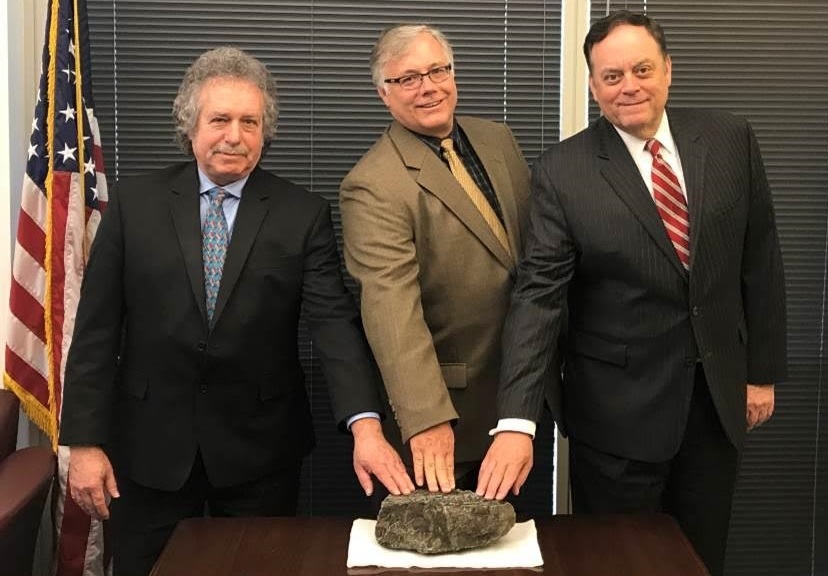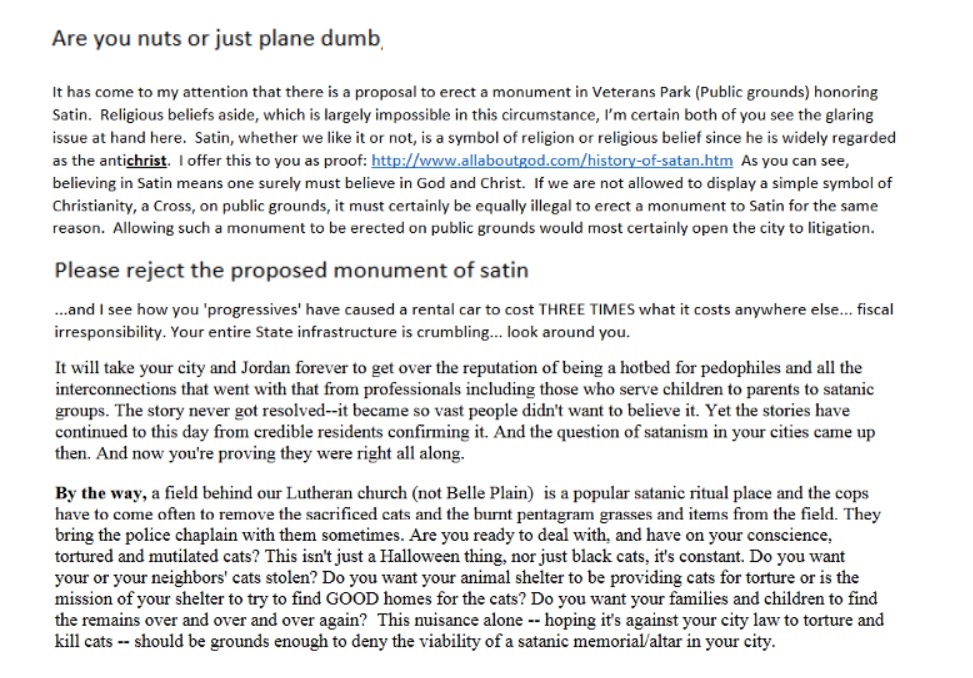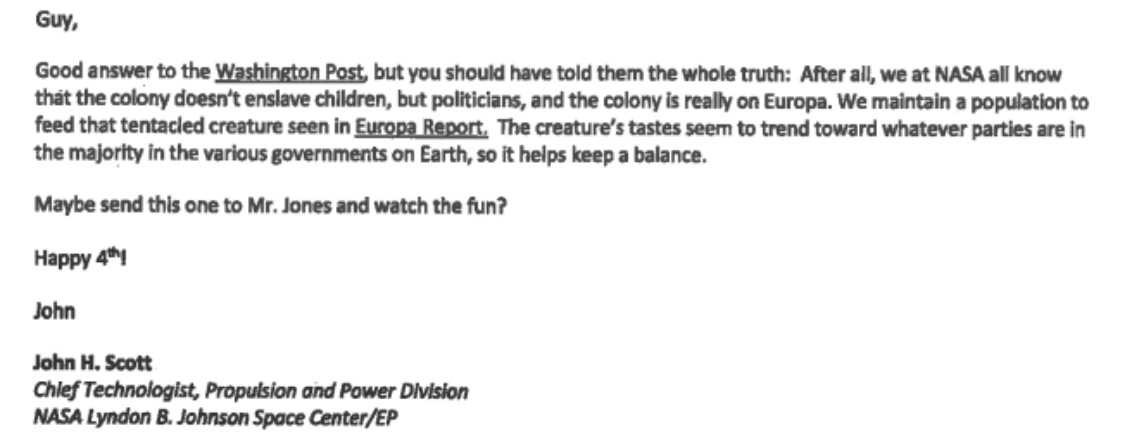Read Part 1 here
MuckRock published over twice as many articles in 2017 as we did last year, which necessitated breaking this Year in Review into two parts. Let’s pick up where we left off, just in time for FOIA’s 51st birthday.
July
-
JPat Brown celebrates the occasion (which happens to fall on the rather obscure holiday of Fourth of July) by showcasing new releases from his collection of presidents with cake. “This is a worthwile use of my time and resources,” says Brown, an adult.
-
Grace Raih obtains emails exchanged between Department of Homeland Security and Portland Police, which show how law enforcement is increasingly treating protests like war zones.
-
Emma Best uncovers the Central Intelligence Agency’s list of 126 excuses it can use to censor information because it’s classified, only to find that the list has been censored because it’s classified.
-
Beryl Lipton talks FOIA appeals with the winners of FOIA March Madness 2017, the Securities and Exchange Commission. It is revealed that the SEC FOIA office celebrated their win by fashioning a literal rock into a trophy called “The MuckRock,” which is the most adorably dorky thing.

-
See? We weren’t kidding.
-
Brown writes about how the Federal Bureau of Investigation found intriguing Aldous Huxley’s warnings of technology eroding the foundation of democracy and wished to subscribe to his newsletter. Ernest Hemingway, however, rankled the Bureau to no end.
-
Caitlin Russell keeps the “Massachusetts police department is bad at transparency” running joke alive with a more-than-a-little-personal takedown of Wareham PD.
-
MuckRock alum Shawn Musgrave comes back a for a guest article on the 2011 “Guido Fawkes” Twitter subpoena case.
-
Alec Shea shares the “Elements of Spy-le” by uncovering the CIA’s declassified guide to good writing. “Please let it be known that I had nothing to do with that title,” says Shea. “It’s not even that good of a pun,” he added, wrongly.
-
Michael Morisy, tired of terrible Twitter takes, digs up a Justice Department memo from the ’70s which outlined the actual legal process of impeachment in case there was a serious attempt to oust Richard Nixon. @LouiseMensch gets tagged a few times while the article is getting promoted, but she never takes the bait.
-
Curtis Waltman commemorates the 49th anniversary of the founding of the American Indian Movement by looking into the FBI files of activists Russell Means and John Trudell.
-
Lipton kicks off a project to track down the full criminal record of Gonzo godfather Hunter S. Thompson, which later produces his correspondence with Lyndon B Johnson on their original letterhead.
-
Best writes about the CIA monitoring Russian interference in U.S. elections over the decades and the FBI’s manual on Soviet recruitment techniques (the latter of which happens to contain the world’s worst pick-up line). These articles are later pointed to when MuckRock is accused of being a Moscow-based disinformation campaign, which we are then told is exactly what a Moscow-based disinformation campaign would do!
-
Nathanael King points out that the FBI can’t make up its mind on what files it has on the Tor Project.
-
Brown creates an interactive map of state public records law response times across the country.
-
Lipton’s Private Prison Project “celebrates” its third year of reporting on the incarceration industry with a reminder that FOIA still does not apply to private prisons at the federal level, a round-up of ways they routinely break the law, and a timeline of what’s changed since she started reporting on them in 2014. Lipton vows to round out her reporting with some less depressing fare next year and starts to sketch out a project looking at death in all 50 states.
- July’s been a bummer, so let’s end with instructions on how to host your own FOIA Karaoke!
August
-
In an article that had a working title we can’t mention in polite company (there’s a clue in the slug), Best profiled the CIA Inspector General that viewed the free press as a hostile non-state intelligence service and the Agency’s “principal villains.”
-
InfoWars FCC Complaints! Russell’s got the documents, folks!
-
Shea’s project on books banned in prison reveals Michigan’s ban on Frantz Fanon’s seminal anti-colonial text Black Skin, White Masks (“advocates racial supremacy”) and Windows Game Programming for Dummies (“Threat to the order and security of the institution”). “I’m starting to have second thoughts about this whole ‘prison’ thing,” says society to nobody in particular.
-
Waltman on how Customs and Border Protection, which has always been terrible at FOIA, has gone full-capital-T Terrible at FOIA since Donald Trump took office.
-
We’re not actually gonna give you the context for this email obtained by Matthew Guariglia; you’re just gonna have to read the article.

-
After a collapse at the Hanford Nuclear Reservation, Russell looks into Environmental Inspection Agency inspection records for the nuclear waste storage facility - and they are Not Good. How Not Good? Inspector-plunging-a-foot-into-toxic-waste Not Good.
-
Cynthia Fernandez’s project to explore dog registration data around the country is derailed by Florida’s sinister feline overlords and the fat cats of Kansas and Minnesota.
-
Eight months into her project on the rape kit backlog, Vanessa Nason reports some genuine good news - there are finally federal guidelines for evidence collection following sexual assault. Granted, they’re just guidelines and, therefore, entirely unenforceable, but that’s better than nothing, right? “Yes,” said Nason. “Yes, dammit, we need a win.”
-
Documents released to Raih show that Massachusetts State Police had so far been paid over $115,000 to defend the controversial Connecticut Expansion Pipeline from peaceful protesters.
-
Speaking of pipelines, North Dakota fusion center reports on Standing Rock protests show that fusion centers continue to grossly violate civil liberties in return for dubious intelligence value … unless you’re in a right-wing militia, that is.
-
Brown writes about an incident from the CIA archives in which psychics travel across time and space to speak to ancient Martians. The description of the experience reads like the liner notes to the best prog rock concept album never made.

-
Thanks to a generous grant from the Kindle Project, MuckRock is able to expand its work investigating the Trump administration and the private prison industry.
-
Best introduces us to the greatest spy you’ve never heard of: Robert Blum, the man who shaped the world.
-
King is told by the Texas Department of Criminal Justice that in order to produce its records on sexual assault in prisons, we’d need to cough up a little over a million dollars in processing fees. Opposite-of-Fun Fact: Texas holds the unenviable title of “prison rape capital of the U.S.”
-
Evan Anderson uncovers a trove of emails sent to the city of Belle Plaine, Minnesota, urging them to reject a monument to satin. “Don’t you mean Satan?” you ask. “That’s not what the email says,” we respond.

-
Waltman reveals that DHS is sourcing reports on the danger of Antifa and “Anarchist Extremist” violence from Alt-Right websites.
-
Relatedly, Brown breaks down Denver Police’s field guide to Juggalos and discovers it’s largely based off a pro-Twiztid, anti-ICP fan site called “Juggalo Holocaust.” He desperately spends the next couple of months trying to get anybody to care about this fact.
-
Fernandez crunches the dog data of Boston and finds that the city is home to 26 pooches named after Tom Brady.
-
Right ahead of college ball kickoff, Lipton reminds us that coaches’ contracts at public universities are just a records request away.
-
Three years after Brown’s initial request for development materials for the National Security Agency’s infamous youth-outreach program the CryptoKidz, the NSA finally reveals … that Slate the rabbit’s sweatshirt says “math” on it.

-
Oh, and it turned out that the NSA had marketed the program to a Men’s Rights Activist parenting site, but other than that it was a bit of a let down.
-
Russell asks why that whole “attempted fascist takeover of the U.S. in the ’30s” thing isn’t a bigger deal.
-
While it was fairly well established that Sheriff Joe Arpaio’s investigation into Barack Obama’s birth certificate was dumb and racist, documents released to Mike Davis revealed that they were even dumber and more racist than you’d think.
September
-
Yes, Virginia, there is a Waffle House index, which the Federal Emergency Management Agency uses to track the impact of natural disasters in primarily southern states.
-
Brown uses records originally released to Bernard Rodriguez to explore Guantanamo Bay’s video game library.
-
When it’s announced that the Trump administration will be ending the Deferred Action for Childhood Arrivals (DACA) program, Morisy looks into if those databases could be used to aid in deportations, while Lipton gets the full list of Harvard professors arrested during a pro-DACA protest in Cambridge, Massachusetts.
-
Speaking of deportations, Lipton writes that under Trump’s harsher immigration policies, the rate of deportations is actually dropping while the number of people held at detention centers steadily rises. Oh, and those detention centers? Overwhelmingly private.
-
In what became our most ripped-off story of the year, Brown discovered a CIA investigation into whether Adolf Hitler had survived the Second World War and was hiding out in Argentina. First off, spoiler alert: probably not. And second off, Simpsons did it.

-
Best talks about how the CIA argued that using the Espionage Act to prosecute leakers was like “driving tacks with a sledge hammer” (and then did it anyway) and how eliminating legal disclosures like FOIA would help cut down on illegal ones by eliminating a “climate of transparency.”
-
Schadenfreude helps makes Morisy’s article on how Breitbart News called for an FBI investigation into a distributed denial-of-service attack it turned out they had accidentally done on themselves one of the year’s most popular pieces.
-
Waltman supplements his work on the use of counterinsurgency tactics at the Standing Rock protests by heading to North Dakota and talking to those who had been on the receiving end of state-sponsored violence.
-
MuckRock celebrates the CIA’s 70th birthday with a bot that tweets CREST articles, a list of good things the Agency’s done, their wartime guide to bribery and blackmail, an alphabet of Agency gadgets, daily diary notes from the year JFK was shot, a list of terrible programs with boring names, a crowdsourced timeline, a crowdsourced map of Agency activities, a breakdown of data trends in CREST, an article on a secret network of ex-spies with a comically evil name, and the ultimate guide to searching CIA’s declassified archives. Our birthday’s in February, CIA; what are you gonna do for us?
- We have the best International Right to Know Day ever when we can finally announce that MuckRock Canada is really happening!
October
-
Best reveals why the Pentagon was terrified of a guy that looked like a Hobbit extra.
-
Lipton revisits the growing trend of prisons replacing in-person family visits with “safer” (read: far more lucrative) video visitation.
-
Oh, yeah, the CIA has another secret network of ex-spies with a comically evil name.
-
Brown tackles the question of whether federal employees can read WikiLeaks, and it turns out it has a surprisingly complicated answer.
-
Morisy announces our first batch of Student Journalist FOIA Grantees - helping the FOIA terrorists of tomorrow get started today.
-
Adanya Lustig uncovers one of the FBI’s more dubious cases - when author Ken Kesey of technicolor bus fame successfully dodged marijuana possession charges by hiding from the Bureau in … Marijuana City, Mexico.

-
On the 50th anniversary of Che Guervara’s death, Brown and Lipton look through the CIA’s archives and find a whole lotta black bars.
-
Best’s lighthearted look into the CIA’s embarrassment over one of their assets in Mexico running a car theft ring takes a dark turn when it’s revealed he was complicit in a genocide.
-
Nason takes a breather from her heavier work to write about the CIA’s skydiving club. That breather lasts for about five minutes before we find an obituary in CREST for a CIA employee … who died while skydiving.
-
Brown looks at some FBI surveillance techniques from the ’40s that sound more like deeply unsettling pranks.
-
On that topic, the CIA once classified an investigation into an office Ku Klux Klan “prank” because it made them look really bad.
-
In what is perhaps MuckRock’s most exciting news all year, Morisy announces that the Knight Foundation and Democracy Fund have pledged $440,000 in support of MuckRock’s mission - which not only means we’re not going anywhere anytime soon (knock on ████), but that after seven years, we can finally bring on both him and fellow co-founder Mitchell Kotler full-time. On behalf of all those smiling dorks in that photo, thanks to all your support and making this possible. We literally couldn’t do it without you.

-
Speaking of survivng despite all odds, Lustig writes about the CIA’s guide to staying alive in the wilderness. tl;dr version: don’t smell so bad your companions murder you.
-
Nikola Tesla’s FBI file is released, and Brown discovers that it’s mostly an increasingly weary J. Edgar Hoover asking people to please stop asking him if the Bureau has Tesla’s death ray.
-
Best wrote on the cosmic irony of the CIA’s master of secrets, Counterintelligence Chief James Angleton, being forced to resort to a FOIA lawsuit in a bid to clear his name.

-
Cautious optimism over the release of the last batch of declassified JFK assassination records quickly turns into irritation we even allowed ourselves to be optimistic in the first place.
-
Best reveals that the NSA tried to use the Espionage Act to prosecute a journalist for using FOIA, which is not a worrying thing for a group of journalists who use FOIA to read at all.
-
MuckRock celebrates Halloween with FOIA costume ideas, police reports about spooky clowns, and a round-up of some of the creepier incidents from the CIA archives.

November
-
Office of the Director of National Intelligence can’t find evidence of its investigation into the Trump campaign. Best uses Google to show ODNI why that makes no sense.
-
Russell wrote a story about Betsy DeVos that’s hard to explain in a sentence to so do us a favor and just read it. Warning: it will make you mad.
-
Waltman heads to the country’s largest trade show for cops and gets pitched on a technology that would literally fuel cop cars with low-level drug busts. No, that is not a joke.
-
Best submits a 5000-word article entitled “The damnatio memoriae of CIA and The Asia Foundation.” Her editor buries his face in his hands and thinks about all the choices in his life that brought him to this place.
-
Brown uncovers the CIA’s classified cat photos.

-
In our first syndicated piece with Broadly, Nason writes about how public hospitals in New York destroy an alarming number of rape kits - despite there being no statute of limitations on sexual assault in the state.
-
Lustig launches a project to find out what cities offered Amazon as part of their hunt for a second headquarters. While some are happy to share this information, others, like the town of Brunswick, Maine, are less thrilled and try to get one past MuckRock with the old “you opened this email, you owe us $750” trick.
-
Scientology records released to Best as part of a FOIA lawsuit (graciously represented pro bono by Dan Novack) reveal that L. Ron Hubbard once tried to get over a bad breakup by offering to become an FBI informant. Whomst among us …
-
Russell writes about how the Las Vegas Metropolitan Police Department significantly restricted their public records policy (arguing that public records are only “public” to other police) in response to an unflattering podcast episode. PROTIP: do not do this - we’ll just write an article that’ll make you look even worse.
-
Best’s Law, which states “With sufficient research, history becomes indistinguishable from a Hideo Kojima game,” is confirmed by Kojima retweeting this article.
-
Emails released to King show National Aeronautics and Space Administration toying with the idea of sending an email to InfoWars revealing the existence of politician-eating tentacle monsters on Europa.

-
Brown digs up a decade-old meme to make fun of the Pentagon’s claim that its list of information exempt from FOIA is exempt from FOIA.
-
Waltman shows the DC police used an LRAD sound cannon - which comes with the risk of permanent hearing loss - to “direct crowd flow” during the Women’s March.
-
Russell’s piece on the moral complexity of civil rights icon Bayard Rustin being monitored by the FBI while working for the CIA becomes our most debated piece of the year.
December
-
With headlines reminding us that they are indeed still a thing, Waltman dusts off his Cell Site Simulator Census.
-
Lustig ends her internship at MuckRock with the launch of a project on maternal deaths in rural hospitals. “I need a vacation,” she says, wearily. The rest of the staff laugh, very bitterly.
-
MuckRock co-founder Kotler has his request for CIA’s collectible card game fulfilled in a matter of months. “Wow, this FOIA thing is super-easy,” he says. The rest of the staff laugh, very bitterly.
-
Best reveals that the FBI might have considered prosecuting her for her FOIA work involving dead Bureau officials. “Can you believe the FBI would do this?” says person on the internet. The rest of the staff laugh, very bitterly.
-
Brown writes about the CIA’s release of the full manual on “Psychological Operations in Guerrilla Warfare” created for the Nicaraguan Contras. In a morbid twist, the manual frequently points to the example of the Hukbalahap in the Philippines … a guerrilla movement destroyed with the assistance of the CIA.
-
Nason ends the year where she began - revealing how little we know about about how little we know about which hospitals can preform rape kit examinations. “I am going to crawl under a blanket and stay there until 2018,” she says and does.
-
All kidding aside, if you’d like to support Nason’s vital work, please consider giving a recurring donation to her project here.
-
Best and Lipton look back at the high weirdness of the CIA’s MKULTRA program and the many, many, many lies the Agency told about it.
-
It took seven years, but the Transportation Security Administration finally release their complaints regarding their full body scanners. Shocker: it turns out people don’t like them very much.
-
Lipton looks back at how private prisons went from being on the ropes at the end of 2016 to utterly ascendant after a year under the Trump presidency. Will 2018 been even more lucrative for the incarceration industry? “Not if I have anything to say about it,” says Lipton, lighting a cigarette and revving a motorcycle, wearing exactly this outfit.

- Brown, a huge idiot, thinks it will be fairly straightforward to summarize the year’s nearly 700 articles in a punchy, light-hearted year in review format. “I am so dumb,” he says, several hours in.
On a personal note, looking back at the year’s worth of stories, it’s hard for me to fathom how much we’ve managed to cover. Just a few years ago, we struggled to put out three articles a week. Now, we’re averaging three a day, and (hopefully) making the case for just how versatile public records reporting can be. I am unbelievably proud of our team for punching so far above our weight class and humbled by the people that we have in our corner. Nobody knows what next year will hold, but there’s no other work I’d rather be doing, and nobody else I’d rather be doing it with. On behalf of myself and the entire MuckRock staff, thank you.
P.S. I am never doing this again.
Image via National Archives Flickr




